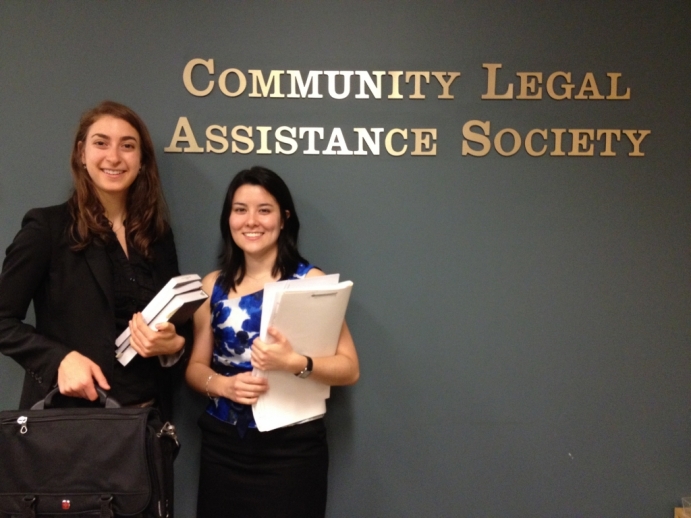By Karen Gross
For Lysandra Bumstead, a chance to spend the summer back home in Vancouver, British Columbia was the "cherry on top." The real prize came in the form of a fellowship from the Student Law Society, and with it a job at the Community Legal Assistance Society (CLAS). The organization provides legal assistance to disadvantaged populations and has also spearheaded some important legal tests.
Bumstead and fellow classmate Leanna Katz (a Donner Fellow) are representing clients who have been involuntarily certified under the BC Mental Health Act. "It's been a really wonderful opportunity to get the hands-on experience and to have the responsibility for fleshing out your own arguments," she says.

Leanna Katz and Lysandra Bumstead
She and Katz have been handling 1-2 hearings per week. Each will meet with a client several times, learn as much as they can about a case, and then appear with the client before a tribunal. The hearing involves cross-examining the psychiatrist responsible for the initial certification.
"I find it pretty intimidating sometimes," says Katz. "Psychiatrists are specialists. I'm learning how to be a specialist in the law, but I'll never have the medical background they do."
While picking up some key medical terms and becoming familiar with various psychiatric medications, the two are learning a lot about oral advocacy, medical/legal ethics and the fine line between what you think may be right and what your client has a right to. Bumstead recalls a particularly tough case involving a client who had thought about attempting suicide, but had not been diagnosed with a serious mental disorder.
"I had to puzzle through my own thoughts about helping someone leave the hospital, when potentially their aim was to go and end their life," she says. "I came to accept that decision-making wasn't on me. It's about making sure the client is able to access his or her rights under the law."

Stawamus Chief Provincial Park in British Columbia
Katz has experienced similar struggles and come to comparable conclusions. "A big part of it is what the client feels is important," she says. "I need to make sure they feel heard and validated. It can help with their treatment, the feeling that their side is being heard and that they've had the doctor's ear for a couple of hours."
Along with their clinical work, both women have been researching a possible challenge to a portion of the Mental Health Act involving the criteria for involuntary detention. CLAS wanted to know whether some of the wording —aimed at preventing "substantial mental or physical deterioration"—was too broad or vague and could be challenged under the Charter of Rights. Separately, the two came to the same conclusion. When it's been challenged in other provinces, the courts have upheld it. They don't believe a test would succeed. But reading through the cases and judgments honed their research skills and left them with better insight into the challenges their clients face. "Doing the advocacy work has given me a much better sense of what it all means in practice," Katz says.
It's also given both women an unexpected revelation about themselves. Neither planned for a career in oral advocacy at the start of the summer but now each is considering it seriously.

Whistler, BC
"I feel like my experience at CLAS has opened up something new for me," says Bumstead. "I always considered myself more of an introvert, doing the paperwork on a case. Now I feel I could be more involved on the front end."



